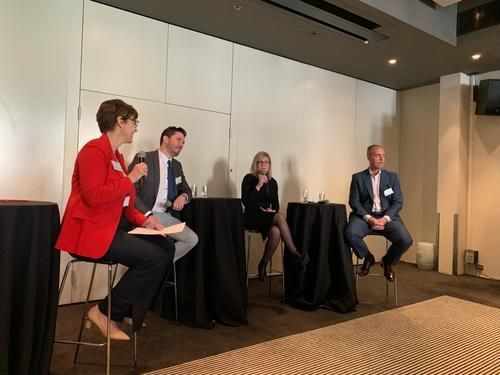News
Cyber Readiness And Resilience

Reduces risk, improves productivity, builds trust
Derwent and My Career Lab co-hosted a forum on the topical subject of Cyber Readiness and Resilience. My Career Lab Co-Founder and Managing Director Sharon Collins moderated an insightful panel discussion with Michelle Price, CEO of Aust Cyber, Anthony Robinson, Partner – Cyber Security at EY and Bastien Treptel, Founder of CTRL Group.
Some of the key themes discussed included:
- Increasing our cyber resilience enhances Australia’s global reputation as a trusted and secure place to do business.
- ‘Cyber literacy’ or knowing how to effectively protect digital assets, is not only relevant for professionals working in the cyber security sector, but it is also becoming a must-have skill for every Australian worker in the digital age, regardless of occupation.
- There’s no silver bullet to being cyber resilient, but there are many strategies we can embark on today to better protect our teams, organisations and personal data.
- It can happen to us all, cyber is a big problem for small businesses as well as for large enterprises.
- At its heart, being cyber resilient involves problem-solving, there is some great work being done to weave cyber into the curriculum at pre-school, primary and high school.
Practical tips:
- Take a log of your assets and their importance. Then work out which ones to protect. Do we know what our key assets are and where they are? Are any operated by third parties?
- With Australia having a talent shortage in Cyber Security, university partnerships are key, reskilling current employees through micro credentialing, targeting those returning to the workforce and thinking laterally about talent with curiosity, a key trait.
- With phishing emails still one of the most common forms of attacks, reward employees with incentives to watch out and be proactive about such attacks, setting an incentivised company goal to reduce phishing emails is a great initiative that can be highly rewarding for an organisations risk rate.
Further contact:
My Career Lab collaborates with organisations to reskill and upskill their current workforce to meet the talent demand in cyber. If this is of interest please connect with Ben Dixon, Head of Customer Success. Derwent are helping organisations search for and engage senior talent in this area through their Cyber Security and Data and Analytics “Centre of Excellence” led by Dani Matthews , Principal.

Share this Article
Recent Articles






